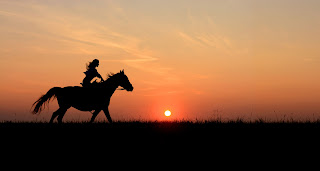This week, a set of four poems appears in
The Loch Raven Review (Vol 19 No 1): "On the Backs of Horses," "The Hunted," "Figure Eights," and "Suicide Stories." Their stories come mostly out of a few short, furious years that, in a lot of ways, beat me. During the worst of it, I landed in a space with horses, and in proximity, found some fragment of grace. It was enough.
Moving to a small town where everyone knew everyone since forever created a different set of problems, but for the first time, I made a few friends there who weren't my siblings. More importantly, I made friends with all the horses. Ours. The neighbors'. The sheepherder's from down the road. The rich doctor's. My Sunday School teacher's chariot racers. Random strangers' horses.
The horse-people may or may not have helped, but the animals grounded me in ways I didn't even know I needed. I also needed to be part of the process that develops between horse and rider, which never came easy. Some of those horses were as beaten down as I was when we met. Others were born into my care, which is a different kind of responsibility. Either way, it requires a vulnerability that I couldn't give to another human at that time. A horse asked it of me, and in giving it up, my life was saved.
Twenty years later, I was far from that place, and my life had changed and changed again. I sought out the horses for a life that wasn't my own and witnessed a similar transformation from a different perspective.
In 2022, writing out of the pandemic and a surgery that double-isolated me, I was surprised to find the stories of those horses landing on the page. More surprising was that they showed up as poetry. Initially, I tried to hammer them into the short-story form that is my trade, but they refused, like a stubborn mare. I had to give up. . . again. And all the horses came back to me.
Disclaimer: as always, I remain a fiction writer, and while every horse is inspired by a living, breathing animal out of my own experience, none of it is exactly biographical. (I get that question a lot.) It's the Emily Dickinson Rule: all of it true; all of it told slant.
One of the first poems to show up, "Out Stealing Horses," is also forthcoming in Red Rock Literary Review. The dedications are deeply personal for different reasons, and I am grateful for each of these horse poems to have found their own space in the world. To read my new poems, visit The Loch Raven Review .
Would that I may always be in proximity to horses.
Plowboy
by Carl Sandburg
After the last red sunset glimmer,
Black on the line of a low hill rise,
Formed into moving shadows, I saw
A plowboy and two horses lined against the gray,
Plowing in the dusk the last furrow.
The turf had a gleam of brown,
And smell of soil was in the air,
And, cool and moist, a haze of April.
I shall remember you long,
Plowboy and horses against the sky in shadow.
I shall remember you and the picture
You made for me,
Turning the turf in the dusk
And haze of an April gloaming.


